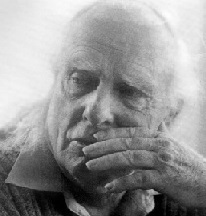Paul Grice
Herbert Paul Grice (March 13, 1913 – August 28, 1988), commonly known as H. P. Grice, was a distinguished British philosopher and linguist, best known for his influential contributions to the philosophy of language, linguistics, and the study of communication. Grice's work on the nature of meaning and communication has had a profound impact on the development of pragmatics, a subfield of linguistics concerned with how context contributes to meaning.
Early Life and Education[edit | edit source]
Grice was born in Birmingham, England, and educated at Clifton College, before winning a scholarship to study at Corpus Christi College, Oxford. At Oxford, he studied under the philosopher Gilbert Ryle and was influenced by the works of Ludwig Wittgenstein, among others. Grice graduated with a first-class degree in Philosophy, Politics and Economics (PPE).
Academic Career[edit | edit source]
After completing his education, Grice began his academic career at Oxford, where he became a lecturer in philosophy. He spent the majority of his early career at Oxford, where he developed his most famous theories on the philosophy of language. In 1967, Grice moved to the United States, where he took a position at the University of California, Berkeley, and he remained there until his retirement.
Contributions to Philosophy[edit | edit source]
Grice's most notable contribution to philosophy is his theory of implicature, which he introduced in his 1967 paper "Logic and Conversation". This theory explores how speakers imply things that are not explicitly stated, relying on the context and shared knowledge between the speaker and listener. Grice proposed that conversational implicature is governed by a set of conversational maxims, which include the maxims of quantity, quality, relation, and manner. These maxims describe how effective communication is achieved and how listeners can infer additional meanings based on the assumption that these maxims are being followed.
Grice's work laid the foundation for much of the contemporary study in pragmatics and has influenced various fields, including sociolinguistics, cognitive science, and artificial intelligence. His theory of implicature has been fundamental in understanding how meaning is constructed in everyday language use.
Later Work and Legacy[edit | edit source]
In his later years, Grice expanded his philosophical inquiry to include the study of intention and rationality, further exploring how these concepts intersect with language and communication. His work has continued to be influential, sparking debates and further research in philosophy, linguistics, and cognitive science.
Grice passed away in Berkeley, California, in 1988, but his legacy lives on through his seminal works and the ongoing research they inspire. He is remembered as a pivotal figure in the philosophy of language, whose theories have shaped the way we understand human communication.
Selected Publications[edit | edit source]
- "Logic and Conversation" (1967)
- "Studies in the Way of Words" (1989)
See Also[edit | edit source]
Search WikiMD
Ad.Tired of being Overweight? Try W8MD's physician weight loss program.
Semaglutide (Ozempic / Wegovy and Tirzepatide (Mounjaro / Zepbound) available.
Advertise on WikiMD
|
WikiMD's Wellness Encyclopedia |
| Let Food Be Thy Medicine Medicine Thy Food - Hippocrates |
Translate this page: - East Asian
中文,
日本,
한국어,
South Asian
हिन्दी,
தமிழ்,
తెలుగు,
Urdu,
ಕನ್ನಡ,
Southeast Asian
Indonesian,
Vietnamese,
Thai,
မြန်မာဘာသာ,
বাংলা
European
español,
Deutsch,
français,
Greek,
português do Brasil,
polski,
română,
русский,
Nederlands,
norsk,
svenska,
suomi,
Italian
Middle Eastern & African
عربى,
Turkish,
Persian,
Hebrew,
Afrikaans,
isiZulu,
Kiswahili,
Other
Bulgarian,
Hungarian,
Czech,
Swedish,
മലയാളം,
मराठी,
ਪੰਜਾਬੀ,
ગુજરાતી,
Portuguese,
Ukrainian
Medical Disclaimer: WikiMD is not a substitute for professional medical advice. The information on WikiMD is provided as an information resource only, may be incorrect, outdated or misleading, and is not to be used or relied on for any diagnostic or treatment purposes. Please consult your health care provider before making any healthcare decisions or for guidance about a specific medical condition. WikiMD expressly disclaims responsibility, and shall have no liability, for any damages, loss, injury, or liability whatsoever suffered as a result of your reliance on the information contained in this site. By visiting this site you agree to the foregoing terms and conditions, which may from time to time be changed or supplemented by WikiMD. If you do not agree to the foregoing terms and conditions, you should not enter or use this site. See full disclaimer.
Credits:Most images are courtesy of Wikimedia commons, and templates, categories Wikipedia, licensed under CC BY SA or similar.
Contributors: Prab R. Tumpati, MD

